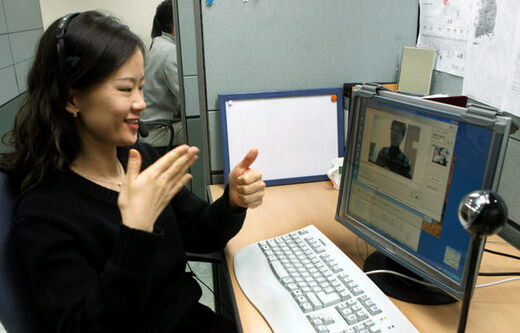hankyoreh
Links to other country sites 다른 나라 사이트 링크
Hearing impaired get a communications boost

"I was able to complete my graduate studies because of you, father. Thank you so much."
"Son, I’m proud of you. I love you."
This son called his father after hearing the news that he had successfully defended his master’s thesis. The father and son were jubilant over the phone. For the first time in their lives, the son was able to say, "thank you" over the phone, and the father was able to respond, "I love you."
The reason it was their first time to do so is because the son is hearing disabled. Using the telephone had previously been impossible.
The two are now able to take advantage of a ‘telecommunications relay service’ to make conversation possible. Ban Hi-jin, the service operator who conveyed the first messages between the father and son, said, "A text message from the son was delivered to his father via voice, and the father’s voice was then delivered to the son via text message."
While ordinary people cannot imagine a day without telephones, many hearing impaired citizens cannot use telephone services. Since last February, however, a new service offered by the Korea Agency for Digital Opportunity and Promotion has helped the hearing impaired make ordinary phone calls. Their words are sent either via text message or sign language through videoconferencing, and operators then speak the message to the call recipient.
Currently, about 200 of such calls are made a day. Operators field calls from hearing impaired customers for anything from setting up appointments for job interviews to ordering a pizza. Some operators find themselves translating verbal spats.
In South Korea, there are an estimated 80,000 disabled people who cannot use telephones without assistance. With the people with which they wish to communicate also suffering in the situation, an estimated one million people experience this type of difficulty in communication on a regular basis.
But the service is just being launched. Sign language translation services at 122 centers nationwide are still at an initial stage, and the agency’s telecommunications relay service is offered on a trial basis for only 400 people so far.
In the United States, this type of telecommunications relay service was brought into service in the 1990s, and is offered 24 hours a day, seven days a week. To fund the service, subscribers pay about US$0.10 a month, and the remaining costs are shouldered by telephone companies. The service has been in full operation in Australia from the 1990s, as well, and the cost there is floated by telephone companies.
South Korea’s Ministry of Information and Communication said about 20 billion won ($US21.3 million) is needed to bring the telecommunications relay service into full swing. The money could be made available if the nation’s 60 million fixed-line and mobile phone subscribers each pay an extra 5 won a month. The agency will survey specific demand for the service within the year in order to draw up future business plans.
Please direct questions or comments to [englishhani@hani.co.kr]
Editorial・opinion
![[Editorial] Intensifying US-China rivalry means Seoul must address uncertainty with Beijing sooner than later [Editorial] Intensifying US-China rivalry means Seoul must address uncertainty with Beijing sooner than later](https://flexible.img.hani.co.kr/flexible/normal/500/300/imgdb/original/2024/0517/8117159322045222.jpg) [Editorial] Intensifying US-China rivalry means Seoul must address uncertainty with Beijing sooner than later
[Editorial] Intensifying US-China rivalry means Seoul must address uncertainty with Beijing sooner than later![[Column] When ‘fairness’ means hate and violence [Column] When ‘fairness’ means hate and violence](https://flexible.img.hani.co.kr/flexible/normal/500/300/imgdb/original/2024/0516/7417158465908824.jpg) [Column] When ‘fairness’ means hate and violence
[Column] When ‘fairness’ means hate and violence- [Editorial] Yoon must stop abusing authority to shield himself from investigation
- [Column] US troop withdrawal from Korea could be the Acheson Line all over
- [Column] How to win back readers who’ve turned to YouTube for news
- [Column] Welcome to the president’s pity party
- [Editorial] Korea must respond firmly to Japan’s attempt to usurp Line
- [Editorial] Transfers of prosecutors investigating Korea’s first lady send chilling message
- [Column] Will Seoul’s ties with Moscow really recover on their own?
- [Column] Samsung’s ‘lost decade’ and Lee Jae-yong’s mismatched chopsticks
Most viewed articles
- 1[Editorial] Transfers of prosecutors investigating Korea’s first lady send chilling message
- 2[Exclusive] Unearthed memo suggests Gwangju Uprising missing may have been cremated
- 3[Column] US troop withdrawal from Korea could be the Acheson Line all over
- 4Xi, Putin ‘oppose acts of military intimidation’ against N. Korea by US in joint statement
- 5[Column] When ‘fairness’ means hate and violence
- 6[Editorial] Intensifying US-China rivalry means Seoul must address uncertainty with Beijing sooner t
- 7‘Shot, stabbed, piled on a truck’: Mystery of missing dead at Gwangju Prison
- 8Spotlight turns to Hyundai Group Chairwoman’s visit to North Korea
- 9[Column] Samsung’s ‘lost decade’ and Lee Jae-yong’s mismatched chopsticks
- 10[Column] Will Seoul’s ties with Moscow really recover on their own?